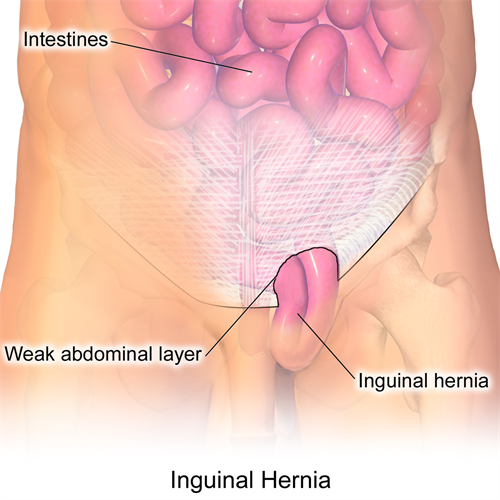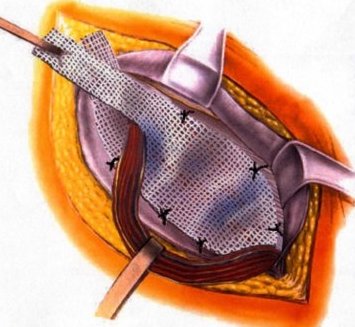Hello everyone!
In today's post I will describe one of the many pathological conditions I encounter at work in the hospital - the inguinal hernia.
Ingninal hernia is the most common hernia in humans. It can occur at every age, from infancy to deep age.
The cause of inguinal hernia is the weakness of the muscles and other structures of the inguinal canal as well as elevated intraabdominal pressure. In children, the cause is more associated with lowering the testicle in the scrotum, which is why it's 10 times more common in male children. Hernias appear more often on the right side (3 : 2).

Source: UCSF, General Surgery
There are two types of hernia: direct and indirect. The direct hernia is formed through the bottom of the inguinal canal most often in the Hasselbach's triangle, while the indirect hernia is formed within the muscle of the kremastera in the spermatic cord (for male) or the round ligament (for female).
Clinical presentation: In some people, the hernias are asymptomatic, while others have painful swelling in the inguinal region. Diagnosis is performed by inspection of the inguinal region in the sitting and lying position and by palpation the inguinal canal with the index finger through the outer inguinal ring. During a medical examination, patients may be required to cough in order to increase intraabdominal pressure and thus facilitate the diagnosis of the hernia
Inguinal hernia is treated surgically. When patients can not be operated because of other illness, they are treated in a conservative manner. In such cases, various aids are used to prevent prolapse of the organs from the abdomen
There are various surgical methods of inguinal hernia repair that have developed for centuries: Stromayr 1559, Czerny 1877, Bassini 1889, McVay 1942, Lichtenstein 1987. Also, various methods are used today, laparoscopic or classical, and the method by Lichtenstein is one of the most prominent methods in which the bottom of the inguinal canal is reinforced with a mesh.
LICHTENSTEIN METHOD
Deep sedation with an anxiolytic, narcotic and hypnotic is combined with a field block of local anesthesia. The incision is carried down through Scarpa's fascia to external oblique aponeurosis. The external oblique aponeurosis is then opened. When we are done with that, we push a hernia back in the abdomen and add a mesh at the bottom of the inguinal canl.
Source: Hospital vita, hernia center
Depending on the patient's health condition, he may go home the same day or he will stay in the hospital for several days for further treatment and observation.
TIPS:
- If you have swelling and pain in the inguinal region, visit an abdominal surgeon to confirm or exclude inguinal hernia. Some patients ignore the symptoms for years, and the hernia increases. This is why a medical examination has been carried out as soon as possible. This will make life easier for you and your abdominal surgeon
- After surgery, it is necessary to avoid harder physical work for up to two months.
- If you are operated, it does not mean that the hernia can not appear again in the same place.
I hope this post was interesting and useful to you.
References:
- Tomislav Sosa. Surgery, 2007. 398-402
- E. Christopher Ellison, Robert M. Zollinger, Jr. Zollinger s atlas of surgical operations, Tenth edition.
- Sachs M, et al. World J Surg, 1997. Historical evaluation of inguinal herna repair.

Congratulations @zmijavci! You have completed some achievement on Steemit and have been rewarded with new badge(s) :
Click on any badge to view your own Board of Honor on SteemitBoard.
For more information about SteemitBoard, click here
If you no longer want to receive notifications, reply to this comment with the word
STOPI read some articles saying that they are having problems with the mesh. It is important for people to focus on good digestive health, fixing with surgery is very risky every time. Great article for awareness.
Prevention is the best medicine,
but surgery is sometimes the only way to treat some pathological conditions.
Very educational. Do you work in surgery or gynecology?
Thanks, abdominal surgery.